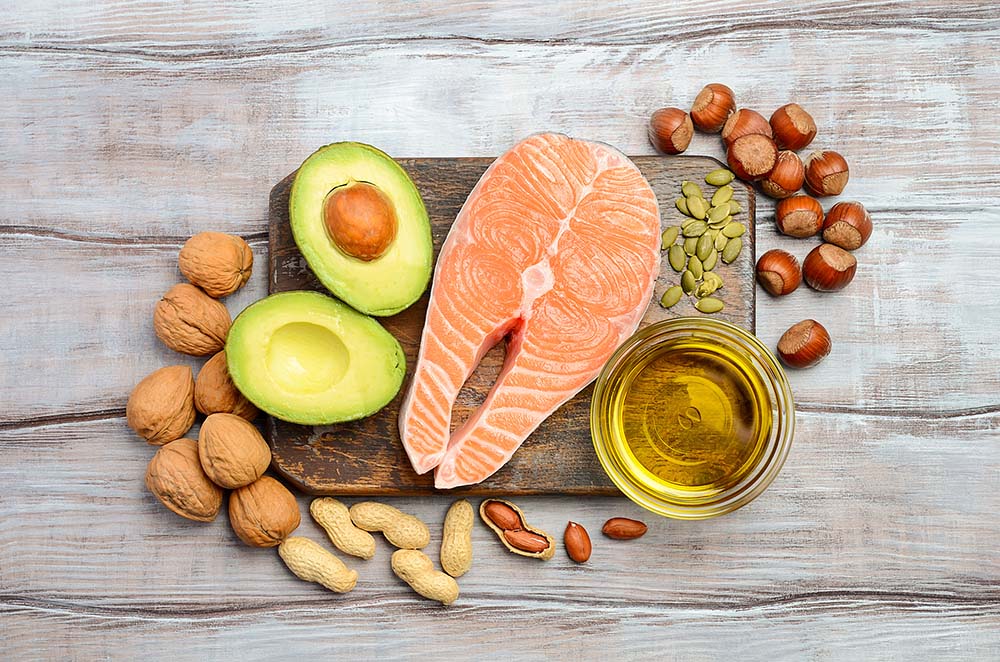Last updated May 22, 2025.
By now, we’re probably all more or less aware that although deep fried food is delicious, it’s not great for our health to eat it every day. On the other hand, we’re also all probably aware that fat is an essential part of a balanced diet. So what are “healthy fats”, and what are the “unhealthy fats”?
What are Healthy Fats?
Healthy fats are monounsaturated and polyunsaturated fats, including omega-3 and omega-6 fatty acids. These fats are considered beneficial for overall health and are associated with various positive effects, including heart health, brain function, and reducing inflammation.
Sources of healthy fats include
- Olive oil: Rich in monounsaturated fats and antioxidants.
- Avocados: Contain monounsaturated fats, fiber, and various vitamins and minerals.
- Nuts and seeds: Almonds, walnuts, chia seeds, flaxseeds, and others are high in healthy fats.
- Fatty fish: Salmon, mackerel, sardines, and trout are rich in omega-3 fatty acids.
- Flaxseed oil and chia seeds: Rich sources of alpha-linolenic acid (ALA), an omega-3 fatty acid.
- Plant-based oils: Canola oil, safflower oil, and sunflower oil contain polyunsaturated fats.
As you may notice, these fats occur naturally in plants and fish. Aside from the plant-based oils, no additional processing is needed to incorporate them into a meal. Healthy fats can have a positive impact on cholesterol levels, reduce the risk of heart disease, support brain health, and aid in the absorption of fat-soluble vitamins.
What are Unhealthy Fats?
Saturated fats and trans fats are typically what are meant when someone uses the term “unhealthy fats” or “bad fats”. These fats can raise LDL (low-density lipoprotein) cholesterol levels, increase the risk of heart disease, and contribute to inflammation.
Sources of unhealthy fats include:
Saturated Fats
Found in animal products such as fatty cuts of meat, butter, full-fat dairy products, and certain tropical oils like coconut oil and palm oil.
Trans Fats
Often found in partially hydrogenated oils used in many processed and fried foods, as well as some margarines and baked goods.
Unfortunately, there’s a reason why the unhealthy fats are used in so many types of foods—they make everything taste good! The consumption of these fats should be limited to promote better heart health and overall well-being.
Why Are Dietary Fats Necessary?
Dietary fats play a crucial role in maintaining overall health and well-being. Here are some reasons why fats are necessary components of the human diet:
Energy Source
Fats are a concentrated source of energy, providing more than twice the calories per gram compared to carbohydrates and proteins. This energy is especially important for supporting bodily functions and physical activity.
Nutrient Absorption
Certain vitamins, known as fat-soluble vitamins (A, D, E, and K), require fat for proper absorption by the body. Fats help transport these vitamins from the digestive system to cells where they are needed.
Cell Structure
Fats are a vital component of cell membranes. They help maintain the integrity and fluidity of cell membranes, which is essential for the proper functioning of cells and communication between them.
Brain Health
The brain is composed of about 60% fat, and fats are essential for its structure and function. Healthy fats, such as omega-3 fatty acids, play a role in brain development, cognitive function, and mood regulation.
Hormone Production
Fats are involved in the synthesis of hormones, including sex hormones (estrogen and testosterone) and stress-related hormones (cortisol). These hormones are crucial for a wide range of bodily functions.
Insulation and Protection
Adipose tissue, which stores fat, serves as insulation that helps regulate body temperature. Additionally, fat deposits provide cushioning and protection to internal organs.
Source of Essential Fatty Acids
Some fatty acids are considered essential, meaning they cannot be synthesized by the body and must be obtained from the diet. Omega-3 and omega-6 fatty acids are examples of essential fatty acids that play roles in inflammation regulation, immune function, and more.
Satiety and Flavor
Fats contribute to the sensation of fullness and satisfaction after a meal, helping to control appetite. They also add flavor and texture to foods, enhancing the palatability of meals.
Making Healthy Choices When it Comes to Fats
Dietary fat is an essential part of a balanced diet. However, we live in a world where unhealthy fats are hidden everywhere, so it’s important to make mindful decisions.
If you want to lose weight and avoid unhealthy fats, try to focus on consuming more foods rich in healthy fats while minimizing the intake of foods high in unhealthy fats.
How To Replace Unhealthy Fats with Healthier Alternatives
Avoiding saturated and trans fats is easier said than done—they are everywhere in fast food, chips, junk food, and more.
Here are some practical swaps and habits to help you replace unhealthy fats with healthier alternatives:
- Switch Out Your Cooking Oils
- Replace butter or lard with extra-virgin olive oil or avocado oil for sautéing and roasting.
- Use a nonstick pan and a light spray of olive oil to cut overall fat use.
- Choose Leaner Proteins
- Opt for skinless poultry, fish, or legumes instead of fattier cuts of red meat.
- When you do eat red meat, trim visible fat and choose lean ground versions (90% lean or higher).
- Snack Wisely
- Swap potato chips or crackers for a handful of nuts (almonds, walnuts) or seeds (pumpkin, chia).
- Trade store-bought baked goods for sliced apple with natural peanut or almond butter.
- Rethink Dairy
- Use low-fat or skim dairy instead of full-fat cheeses and yogurts.
- Try Greek yogurt or cottage cheese for a high-protein, lower-fat option.
- Focus on Whole Foods
- Incorporate avocados, olives, and fatty fish (salmon, mackerel) into salads and bowls.
- Try making sandwiches with hummus instead of mayo or margarine—it works, trust us!
- Read Labels Carefully
- Avoid products listing “partially hydrogenated oils” (trans fats) or high levels of saturated fat.
- Look for spreads made from olive, canola, or sunflower oil.
- Modify Baking and Dressings
- In recipes, replace half the butter with applesauce or mashed banana for moisture and flavor.
- Make homemade salad dressings with olive oil and vinegar rather than creamy store-bought versions.
- Plan Ahead
- Prep snacks (cut veggies with guacamole) and meals (baked fish with roasted veggies) so you’re not grabbing convenience foods.
- Batch-cook healthy stews or stir-fries using lean proteins and plenty of vegetables dressed in healthy fats.
By consistently making a few simple swaps, you’ll shift your diet toward monounsaturated and polyunsaturated fats—supporting heart health, better nutrient absorption, and more stable energy throughout your day.
Get Help Losing Weight and Cutting Out Unhealthy Fats at Blue Sky MD
If you’re struggling to lose weight, Blue Sky MD can help! As a medical weight loss clinic, we have more than a decade of experience helping thousands of patients find lasting success with weight loss. Contact us today to get started!



